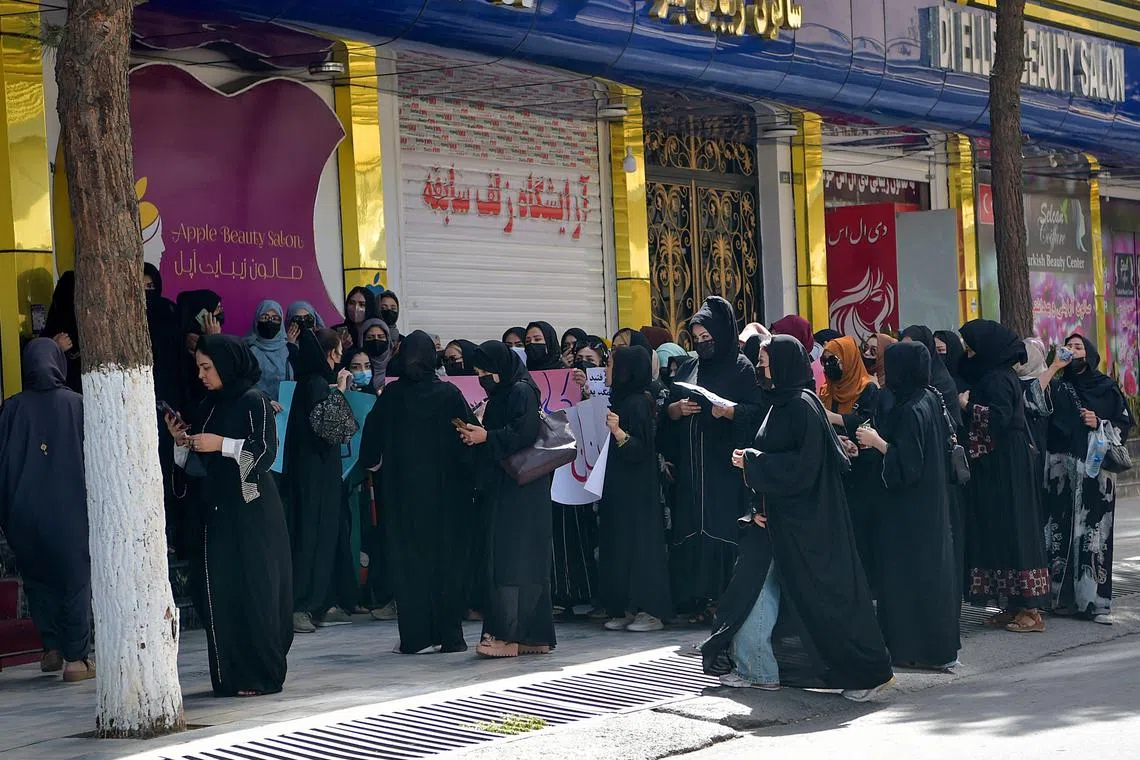Afghan women protest against beauty parlour ban
Sign up now: Get insights on Asia's fast-moving developments

Afghanistan's Taliban authorities have ordered beauty parlours across the country to shut within a month.
PHOTO: AFP
KABUL - Security officials shot in the air and used fire hoses on Wednesday to disperse dozens of Afghan women protesting in Kabul against an order by the Taliban authorities to shut down beauty parlours, the latest curb to squeeze them out of public life.
Since seizing power in August 2021, the Taliban government has barred girls and women from high schools and universities,
The order issued last month forces the closure of thousands of beauty parlours nationwide run by women – often the only source of income for households – and outlaws one of the few remaining opportunities for them to socialise away from home.
“Don’t take my bread and water,” read a sign carried by one of the protesters in Butcher Street, which boasts a concentration of the capital’s salons.
Public protests are rare in Afghanistan – and frequently dispersed by force – but AFP saw around 50 women taking part in Wednesday’s gathering, quickly attracting the attention of security personnel.
Protesters later shared videos and photos with journalists that showed the authorities using a fire hose to disperse them as shots could be heard in the background.
“Today, we arranged this protest to talk and negotiate,” said a salon worker, whose name has not been published by AFP for security reasons.
“But today, no one came to talk to us, to listen to us. They didn’t pay any attention to us, and after a while, they dispersed us by aerial firing and water cannon.”
In late June, the Ministry for the Promotion of Virtue and Prevention of Vice gave salons a month to close down, saying the grace period would allow them to use up stock.
It said it made the order because extravagant sums spent on makeovers caused hardships for poor families, and that some treatments at the salons were un-Islamic.
Too much make-up prevented women from proper ablutions for prayer, the ministry said, while eyelash extensions and hair weaving were also forbidden.
A copy of the order seen by AFP said it was “based on verbal instruction from the supreme leader” Hibatullah Akhundzada.
Beauty parlours mushroomed across Kabul and other Afghan cities in the 20 years that US-led forces occupied the country.
They were seen as a safe place to gather and socialise away from men and provided vital business opportunities for women.
‘Gender apartheid’
A report to the United Nations’ Human Rights Council in June by Mr Richard Bennett, the special rapporteur for Afghanistan, said the plight of women and girls in the country “was among the worst in the world”.
“Grave, systematic and institutionalised discrimination against women and girls is at the heart of Taliban ideology and rule, which also gives rise to concerns that they may be responsible for gender apartheid,” Mr Bennett said.
Mr Akhundzada, who rarely appears in public and rules by decree from the Taliban’s birthplace in Kandahar, said in June that Afghan women were being saved from “traditional oppressions” by the adoption of Islamic governance and their status as “free and dignified human beings” restored.
He said in a statement that steps had been taken to provide women with a “comfortable and prosperous life according to Islamic syariah”.
Women have also mostly been barred from working for the UN or non-governmental organisations, and thousands have been sacked from government jobs or are being paid to stay at home. AFP


